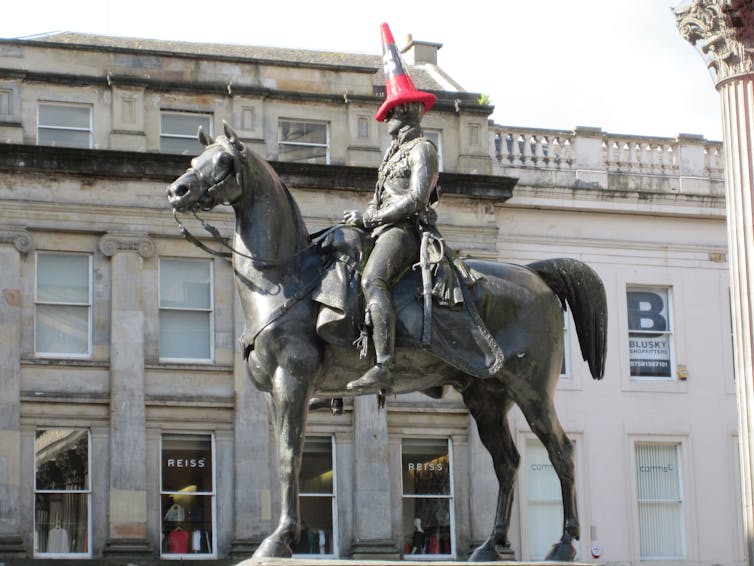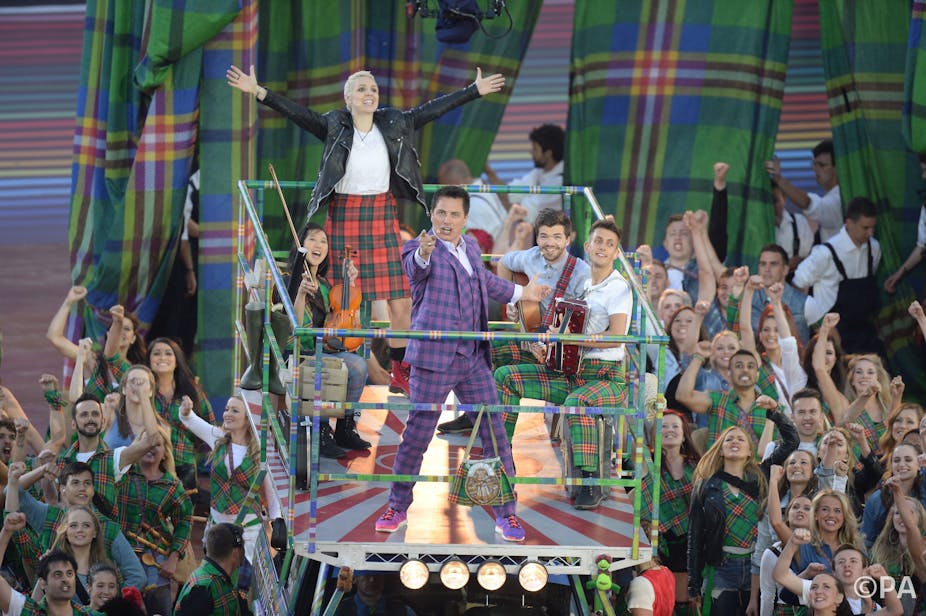From John Barrowman’s Scottish accent to Susan Boyle’s nervous take of Mull of Kintyre to the cheered tribute to Nelson Mandela, the Commonwealth Games gave us an opening ceremony to remember. And that’s before anyone mentions that kiss. We asked events specialist Joe Goldblatt and Simon Pia, veteran of Scottish journalism, what it all meant.
Simon Pia, Lecturer in Journalism, Edinburgh Napier University
The kiss that went round the Commonwealth was surprisingly perhaps the least contentious part of an opening ceremony of what are going to be –- no matter what anyone says – a highly politicised Glasgow Games.
John Barrowman’s embrace with a male dancer during an opening stage that turned Celtic Park into something akin to Willie Wonka’s Chocolate Factory was a bold, politically correct message that no one in what is still the UK was going to take issue with. How other parts of the Commonwealth, such as Uganda, felt about it is another matter.
But within minutes of the ceremony starting, social media, the litmus test for the zeitgeist, was already dividing along political lines. Nationalists and independence campaigners were cringing behind the sofa at home tweeting abuse about Barrowman -– a high profile unionist -– and what they saw as a naff rather than kitsch extravaganza coming in at over £20m.
Surrealism-sur-Clyde, at times, as giant tea-cakes and sugary soft drinks twirled around a statue of the Duke of Wellington with a traffic cone on his head. Glasgow got it as did the rest of Scotland, but elsewhere? Rene Magritte was not un Ecossais, n’est pas?

But what Glasgow did was very Scottish. Knowing it couldn’t compete with Danny Boyle’s Olympics, or even perhaps afraid to, it decided to do what it does best –- take the piss out of itself.
Some got the joke while others, particularly nationalists, didn’t. Or maybe it just wasn’t a very funny one. But Scotland taking itself seriously is essential to the nationalist mindset, particularly at this time in its history. Glasgow didn’t and this was seen as a slap in the face.
A sombre first minister pointedly referred to Scotland rather than Glasgow in his short speech, breaking the protocol of games etiquette which should be all about the host city. But Alex Salmond has never been known to miss an opportunity to make his point or wave his saltire, regardless of the circumstances.
But the whimsy of Glasgow’s approach opened up the metaphysical dilemma at the heart of the independence debate and Scotland’s existential angst over its identity. Social media was awash with the ceremony reflecting what an independent Scotland would look like –- a naff little place that is a bit of an embarrassment.
The paranoid wing of the nationalist camp, which is substantial, saw it as a unionist plot whereas the more measured in their ranks reckoned such pap can only be expected as the product of an infantalised people under an imperial yoke.
Meanwhile the Better Together campaign was hailing it as a feel-good success as God Save the Queen reverberated around that republican heartland of Scotland, Celtic Park; and the Red Arrows flew overhead billowing red, white and blue streams across the summer night sky.
The mainstream Scottish media gave it the thumbs up on its front-page splashes as did leading TV and radio bulletins. The media wants the games to succeed. Some of the more discerning elements, aka the awkward squad such as the critics, were less enthusiastic in their reviews, some even scathing.
But all this misses what opening ceremonies are about. They are eminently forgettable and by their very nature naff and tediously boring. The 2012 Olympic ceremony was an anomaly.
The Glasgow gig was pawky, cheeky, lively, corny, naff and compulsive as it just avoided turning into a complete car crash let alone a turning point in the referendum.
Joe Goldblatt, Professor of Planned Events at Queen Margaret University, Edinburgh
Beauty may be in the eye of the beholder, but when one billion people throughout the world behold an opening ceremony such as the one staged to open the 20th Commonwealth Games in Glasgow yesterday, the controversy often reaches a fever pitch.
It is important to place these events in a historical perspective. The majority of public events are funded by taxpayers, so millions of people have a vested interest in their content and legacy. The London 2012 Olympic Games opening ceremony’s budget was estimated at £65m. Some taxpayers would ask, and rightly so, how many new hospitals and schools could be constructed with this level of funding? In contrast, the budget for the opening and closing ceremonies in Glasgow is £14m.
Opening ceremonies are not just about using bread and circuses as a means of amusing and even distracting the public. These events do provide escapism from the mundane and even from serious catastrophes of the day, including the Malaysia Airlines crash in the Ukraine, but actually serve a far greater purpose – to tell the story of the host city or nation to the world. This is what leads to their controversy.
In the past, opening ceremonies producers have sought to focus only on the positive aspects of a destination and to provide popular entertainment for the audience both in the stadium and through television. This was certainly true during the London 2012 opening ceremony.
Danny Boyle’s showpiece focused on the historical development of the United Kingdom and paid tribute to key historical milestones such as the development of the industrial age, the NHS and even the internet. It was also criticised for not examining some of the darker chapters in British life, however.
Glasgow is sometimes described in tourism marketing jargon as being representative of “edge tourism”. This means there is both a dark and light side to the city, both of which are enjoyed by tourists. Glasgow 2014 producer David Zolkwer largely succeeded in telling this complex story to the world, having made several correct choices along the way.
Above all, the show did not avoid the over-the-top brashness that you would expect of an aspirational city like Glasgow. This included a same-sex kiss at the top of the show to help demonstrate Glasgow’s tolerance and embrace of diversity. At the tail of the show they saluted Nelson Mandela through word and song. This was once again a reminder to the world that while others hesitated, Glasgow stepped boldly forward to be the first to honour this great and good man with its freedom of the city award, even though he was a prisoner and could not accept it until many years later.
Second, for the first time in a mega event they incorporated an opportunity for the worldwide audience to contribute to UNICEF. This dramatically changed the usual focus of opening ceremonies from being one massive party without a purpose to one that could change the world one person and one event at a time. This is highly commendable and will most likely be adopted by most major events in future. Who knows, like many other Scottish inventions it might become known as the “Glasgow effect”.
Finally, although some would question the relevance of the panto approach to some of the Glasgow 2014 segments, it is important to note that Scottish panto has a long and storied tradition in this land. It is therefore a logical way to effectively communicate to the masses the important themes of humanity, generosity, courage and even good humour.
When the role of public events is chronicled, I am convinced that Glasgow 2014 will be remembered as having accurately reflected a city and country that is in great dramatic transition. The producers of the opening ceremony will be remembered, like others before them, for their controversial choices. They will also be remembered in this case, more than any other I have seen, for their bold commitment to using fundraising to create a better world. This is the kind of controversy we need more of in the future.

